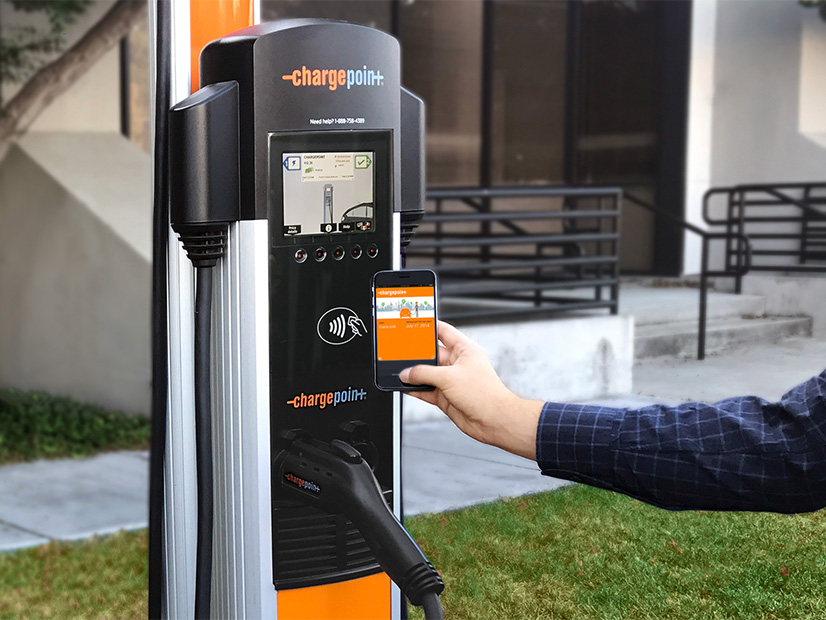
With more EV drivers using their smartphones to pay for vehicle charging, ChargePoint has asked Nevada regulators for flexibility to leave magnetic-stripe or chip credit-card readers off its public stations.
The request was made in connection with NV Energy’s $100 million EV infrastructure plan that the Public Utilities Commission of Nevada (PUCN) approved in November. (See NV Energy Gets Green Light for $100M EV Charger Plan.)
But PUCN voted 3-0 Tuesday to reject ChargePoint’s proposed changes to the charging station technical standards included in NV Energy’s plan. The plan says that stations “must accept a credit or debit card (magnetic stripe and chip card) without incurring any additional fees … in compliance with ISO 15118.”
The commission instead voted to reaffirm its Nov. 30 order approving NV Energy’s plan, but it made a grammatical change in the payment requirement. The requirement now says that charging stations “must accept a credit or debit card (magnetic stripe and chip card) without incurring any additional fees … and be in compliance with ISO 15118.”
The commission said that the technical requirements are minimum standards, and “other forms of payment may be offered and accepted in addition.”
“The commission reaffirms that more options for payment, rather than fewer options, will make it easier for customers to pay,” the order said.
In reaffirming its Nov. 30 order the commission also rejected a request from EVgo, another EV charging station provider. EVgo asked the commission to give third parties participating in NV Energy’s plan more flexibility to decide the number, type and capacity of chargers at a particular site.
EVgo also asked that the minimum power requirement for DC fast-charging stations installed as part of the plan be 100 kW, rather than 150 kW.
NV Energy’s plan, known as the Economic Recovery Transportation Electrification Plan (ERTEP), is a requirement of Senate Bill 448, a product of the legislature’s 2021 session.
The three-year plan, which starts this year, includes a network of electric vehicle charging sites throughout the state.
Paying With Smartphones
In a petition filed with PUCN last month, ChargePoint said that “real world evidence” indicates most EV drivers prefer to use a smartphone app or other mobile payment method to pay for charging.
The petition argued that requiring magnetic-stripe and chip card readers nearly doubles the lifetime cost of a Level 2 charging station, “with the predictable result that fewer charging stations will be deployed through the plan.”
Magnetic-stripe and chip readers are susceptible to fraud and are unreliable when used outdoors, the petition said.
“ChargePoint is concerned that the payment standards NV Energy has proposed drastically will limit the equipment and vendors that will be able to participate in the plan,” the petition said.
ChargePoint asked that the order be changed to require the stations to accept credit cards, but not specify the card-reader technology. Alternatively, the company suggested that charging-station hosts be allowed to ask for and receive a waiver of the magnetic-stripe and chip card reader requirement.
In a response to the petition, NV Energy said the technical requirements were a topic of “substantial debate” during proceedings leading up to the commission’s Nov. 30 order, and ChargePoint is simply rehashing those arguments.
During testimony, NV Energy officials shared concerns that EV drivers without a smartphone wouldn’t be able to use charging stations that lacked magnetic-stripe and chip readers.
Although ChargePoint said the requirements would limit the number of vendors that could participate in NV Energy’s plan, the utility responded that “the plan can be fully and effectively implemented with a limited number of … vendors willing and able to comply with the technical requirements.”
California Consistency
The Sierra Club and Nevadans for Clean Affordable Reliable Energy (NCARE) weighed in on ChargePoint’s petition, saying EV charging stations deployed as part of NV Energy’s plan should accept credit cards, debit cards and cash cards.
But NCARE questioned the need for magnetic-stripe readers, saying the technology is being phased out.
Many EV charging stations don’t directly accept credit, debit or cash cards and instead require use of a proprietary app or a call to an 800 number, NCARE representative Max Baumhefner testified in November. Prepaid debit cards are especially important to those who are “unbanked” or “underbanked,” he said.
In California, regulations require public charging stations to include a chip reader for credit, debit and cash cards, Baumhefner said, adding that Washington may soon follow suit.
“While contactless credit cards have gained market share in recent years, the debit and cash card market has not seen the adoption of contactless technology at the same rate,” Baumhefner said.
NCARE recommended that NV Energy’s plan mirror the California standards for payment at EV charging stations. Because California accounts for about half of the EV market in the U.S., makers of EV charging equipment will likely be basing designs on California standards, the group said.



